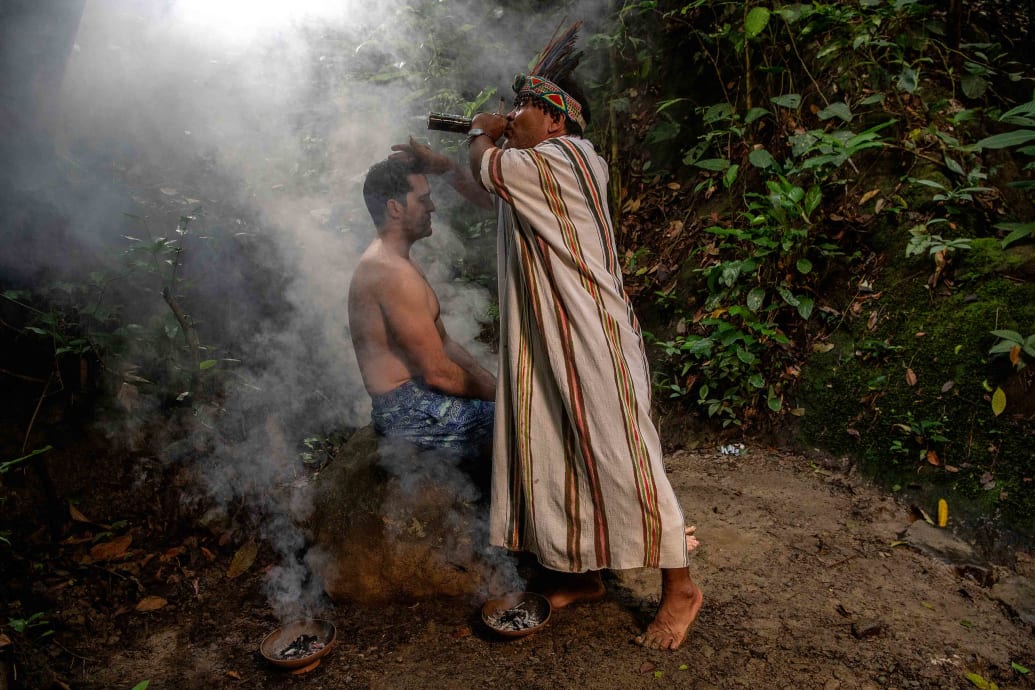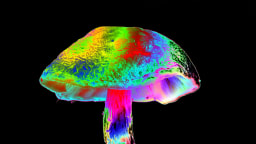FIGHTING NEW BATTLES
In January, Oregon will be the first state to offer controlled use of magic mushrooms. Veterans forced overseas for psilocybin therapy say they will be among the first in line.
Deborah Bloom
Published Dec. 30, 2022

Photo Illustration by The Daily Beast / Getty
In 1995, Amanda joined the U.S. Air Force when at the height of her confidence. Originally a shy kid from central Oregon, she’d spent most of her adolescence building up her self-esteem, performing in pageants, and high school theater, choir and debate. At 20 years old, she marched into her local recruitment office to enlist in the military, ready to travel the world and build self-discipline.
By the time her service was over in 2000, her confidence had “unraveled,” as she describes it. Amanda, whose last name is being withheld for privacy concerns, was sexually assaulted by a fellow military member a year into her enlistment. Her mental health suffered, and after years of tumultuous relationships with other service members, she was honorably discharged close to four-months pregnant, with severe symptoms of undiagnosed post traumatic stress disorder.
She would eventually return to Oregon angry, irritable, twice-divorced, and with a new infant. More than 20 years later, Amanda is working as a grief counselor in Medford and has most of her PTSD symptoms under control.
After taking a class on psychedelic therapy, she became interested in trying psilocybin, the hallucinogenic substance derived from magic mushrooms, to try rooting out some of the more deeply embedded trauma. “I really believe that psilocybin therapy can reconnect or even change those neural pathways, because I need a reset,” Amanda said in an interview with The Daily Beast. “I’ve done all the hard work, but I don’t know how to fix that part and I really need to.”
Amanda will soon get her chance. In January, Oregon will become the first state to offer controlled use of magic mushrooms, thanks to Measure 109, which voters passed in 2020 and allows for the legal manufacture, delivery and administration of psilocybin in licensed facilities. The state will begin processing licenses in January, and organizations that connect veterans to psychedelics will be watching the rollout closely, hopeful the Beaver State will be home to future psilocybin retreats, where new cohorts of facilitators can be trained, and where many of those trained facilitators are likely to be veterans themselves.
The Heroic Hearts Program currently offers ayahuasca retreats in Mexico and Peru to veterans with a history of military combat and/or sexual assault. Founder Jesse Gould said he hopes to set up an outpost in Oregon within the next year. An Army veteran who credits ayahuasca for helping him heal from PTSD, Gould envisions a pilot program where veterans are treated with magic mushrooms in a group therapy setting led by veterans who’ve done their own healing through psychedelics.
“We’re trying to create this self-supporting ecosystem to keep costs down, make it scalable and take the burden off of therapists,” Gould said. “The veterans can help support their brothers and sisters who they relate to. It’s training communities to heal themselves.”

Jesse Gould is the founder of the Heroic Heroes Project.
Jeremy Lock
The Synaptic Institute, an organization that trains new psychedelic facilitators, recently announced plans to earmark scholarship funds for veterans entering the training program, which can cost upwards of $8,000. Veterans of War, a program that offers fellowships to service members for psychedelic retreats in Peru and Costa Rica, intends to train veterans as facilitators at a future service site in Oregon. The Mission Within, which runs psychedelic retreats in Mexico for special operations veterans, also plans to establish a training program in Oregon for service members.
“A lot of people, when they go through a retreat and experience healing through psychedelics, they want to give back and they want to get involved,” said TMW founder Dr. Martin Polanco.
Though there are numerous studies proving the efficacy of psilocybin when treating symptoms of depression, addiction, and PTSD, the Food and Drug Administration still classifies psilocybin as a Schedule 1 Drug—of no known medical value. Oregon and Colorado have both legalized the controlled use of psilocybin, with Colorado’s program scheduled to roll out in 2024. Other cities, such as San Francisco and Washington DC have passed ballot measures to decriminalize the drug.
Veterans looking to try magic mushrooms without breaking U.S. law must travel to either Latin America or the Caribbean to find a retreat. Armand Lecomte, a marine corps veteran who claims psychedelic-assisted treatment saved his life, helps orchestrate psilocybin retreats in Jamaica several times a year for MycoMeditations. A Portland resident, Lecomte urged state and local leaders to legalize the therapeutic use of psilocybin. He said he plans to get trained as a licensed facilitator in Oregon.
“It’s ridiculous these veterans have to leave the country they served to get the healing they need,” he said. To date, 30 men in Lecomte’s battalion have died by suicide. “If some of my brethren had access to this, they’d still be here.”
Despite 56 percent of Oregonians voting in favor of Measure 109 in 2020, a majority of counties voted this November to opt-out of its implementation. Back in July, while commissioners in rural Deschutes County considered adding a ban on legal psilocybin to the ballot, retired Navy SEAL Chad Kuske urged local leaders to consider veterans.
After 12 combat deployments and years of suffering from PTSD, depression and anxiety, Kuske sought psilocybin therapy in Mexico. “It radically changed my life,” he said at the meeting. “If you’re a veteran struggling with a traumatic brain injury or PTSD, going to a foreign country can be a monumentally terrifying thing to do,” Kuske told county commissioners. “Especially when you're going to embark on a healing journey.”
Once voters passed Measure 109, Rose Moulin-Franco moved to Ashland, Ore. to pursue her dream of opening up a wellness center, where she hopes to offer psilocybin treatment in addition to floatation tank therapy, sound baths, group meditation, and other forms of treatment. A military veteran who served during the Vietnam Era, she began exploring the use of psychedelics following the death of her husband, who had suffered “horrendous PTSD” after three tours in Vietnam.
Moulin-Franco found hallucinogens helpful in letting go of past trauma. She, like Amanda in Medford, was living with the trauma of being sexually assaulted in the military. (Almost one in every four women in the military face sexual assault while in the service, according to a New York Times analysis.) After her husband’s death, Moulin-France became a trauma specialist.
Shrooms Fight Depression Better Than Normal Meds, Study Says
HAVE A NICE TRIP
Tony Ho Tran

Until recently, she’d been eyeing a tract of remote land in Jackson County as a potential wellness center site. But the county commissioners voted to restrict psilocybin service centers from rural parts of the county and put the kibosh on that plan. Moulin-Franco is frustrated, but is determined to build a service center wherever she’s allowed. “My county wants me to treat veterans with PTSD and TBIs alongside noisy freeways? Fine, but it’s not ideal,” Moulin-Franco said.
Describing herself as traditional, veteran airwoman Amanda says she hopes to one day be able to legally try psilocybin in a safe, clinical setting. She doesn’t think she’d feel comfortable finding magic mushrooms on the black market, Amanda said. And the idea of traveling outside the country for the treatment is a no-go.
“I didn’t do drugs growing up. I don’t like doing stuff that’s illegal,” Amanda said. She said she wants to try magic mushrooms with a trained, credentialed facilitator she knows and trusts.“I want to do it in a way that is clinically appropriate and evidence based. Otherwise, I won’t have much belief in it.”
No comments:
Post a Comment